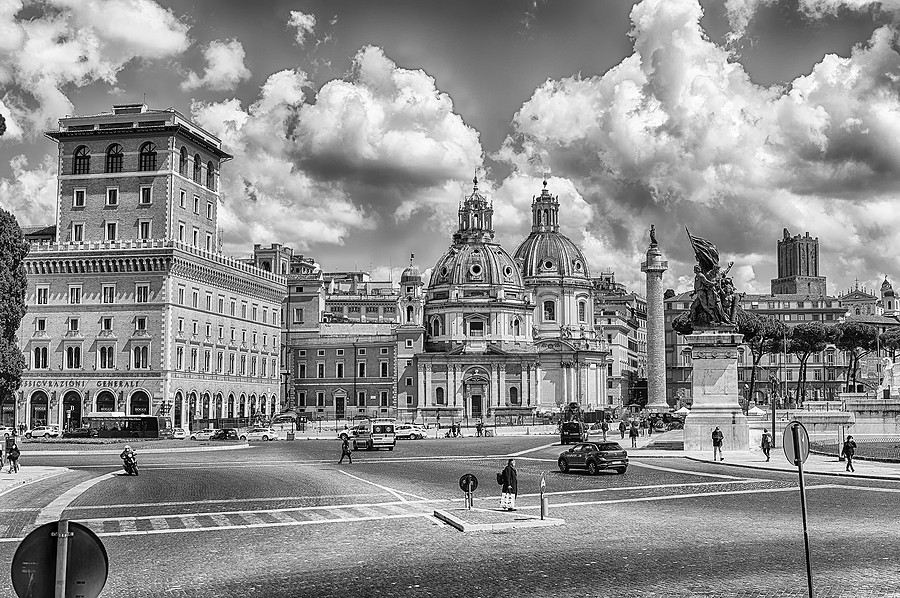
June 30, 2023

Piazza Venezia
Source: Bigstock
To the Eternal City for the saddest of occasions, the funeral of the mother of Taki, 17, and Maria, 15, two of my four grandchildren. Assia was of noble birth and met my son John Taki at the Rosey school in Switzerland, where they both studied skiing and other such useful pursuits. They had a grand wedding at her ancestral home near Rome and went off on their honeymoon on my boat with twelve of their friends. After the two children were born they separated but remained closer than they ever were while married. She fought for two years the ghastly leukemia that finally killed her at 41 years of age. Their friends from school were all there, some having flown over from America in order to say their last goodbyes. The death of someone so young and attractive is hard to put into words without sounding doleful, suffice it to say we Greeks had it right long ago when we preached that whom the gods love they take early.
The beautiful old church, the Catholic ceremony, and a perceptive speech by a very learned man of God helped ease the pain one feels over the unfairness of it all. My boy asked me not to dwell on it, hence I will not. But I will say how much I love the Catholic Church—its rituals and its ceremony. Hymns sung by a small choir were of heartbreaking grace and beauty, leaving no dry eyes anywhere.
Rome is one vast museum, desecrated by long lines of tourists marching up and down its narrow sidewalks while looking at their mobiles and speaking mostly in Chinese and American. To describe the city as eternal and beautiful is a crude cliché, like calling Lily James enchanting, because Rome is Rome, unique but no illusion. It is without order or propriety, a lazy beauty that doesn’t take care of itself, a city fixated on romance and broken hearts.
Rome is the voice and spirit of Italy, a place where unspeakable crimes and cruelties have taken place throughout the ages, where unimagined splendors have been constructed, and where Catholicism reigns supreme. Rome is seductive and mesmerizing; its spirit is Eros. She’s not fragile like Florence and Venice, and not raw and carnal like Naples.
I walked down the Via del Corso early in the morning, then turned right on Via Condotti to the Piazza di Spagna. All the old shops I used to know are gone, replaced by multinational stores and labels. The historic piazza and the Spanish steps were already packed with tourists by 9 a.m., bringing to mind the late ’50s when we’d stop for coffee in the empty square on our way to the Foro Italico and the tennis tournament. History and culture now take second place to giant Dior and Prada signs that overshadow and in a way desecrate the surroundings. As if subliminally acknowledging this vulgarism, Keats’ house is empty of visitors and its windows only half open. I stood there for about ten minutes and not a single person looked at the poet’s last dwelling, in fact the crowds seemed to see the place but not take it in.
Never mind, the huge ads for Dior served their purpose and impressed the mob, some even taking pics of the horror with their telephones. I walked back to the Piazza Venezia, where the Austrian embassy was located back in 1914, and where my father-in-law was born in the very same edifice where Mussolini used to address the mob. Yes, those were the days.
My daughter gave a lunch after the burial at a wonderful restaurant with the quaint name of the Due Ladrone (the two thieves). We were about twenty and I sat with my friend Leopoldo, a Neapolitan nobleman whose father was a good friend of Galeazzo Ciano, the Duce’s son-in-law and foreign minister. History has not been kind to Ciano, and I find that puzzling. He did not want Italy to blindly follow Hitler, and he paid for it with his life. Two women in particular, Suni Agnelli and Caroline Moorhead, wrote about him in their books and made him out to be a vain and silly man. I found Moorehead’s book about Edda Ciano uneven and not really history but gossip, while Agnelli’s—We Always Wore Sailor Suits—was unreadable. Suni’s book came out something like fifty years ago, and I remember her brother Gianni was not best pleased. But he said nothing, just a raised eyebrow to show displeasure. Fiat, after all, was a major contributor to the war effort, so why go and dig up a lot of old gossip about Ciano’s womanizing? Today, if I had stopped 1,000, even 10,000 tourists in Rome, not a single one would have heard of Galeazzo Ciano.
But then very few would have heard of Cicero, Virgil, Horace, Ovid, Tacitus, Leonardo, Michelangelo, Bernini, Caravaggio, and others of their kind. They would have heard of Mark Antony because Richard Burton played him in the movie back in 1963, although they would be confused about the Greek Queen Cleopatra because the crude Americans now show her to have been black, whereas Elizabeth Taylor’s agents claim that the actress was white. See how confusing it all gets? And yet, when I asked some gawkers if they had heard of Hadrian and Antinous, they had encyclopedic knowledge of the Roman emperor and his catamite. Ironically, the last time I used the word “catamite” it cost me a couple of hundred thousand pounds because the person I had called that took umbrage and sued. Antinous drowned in the Nile a couple of thousand years ago, so this time no cigar.